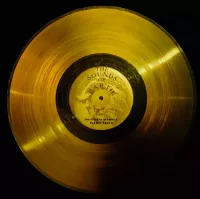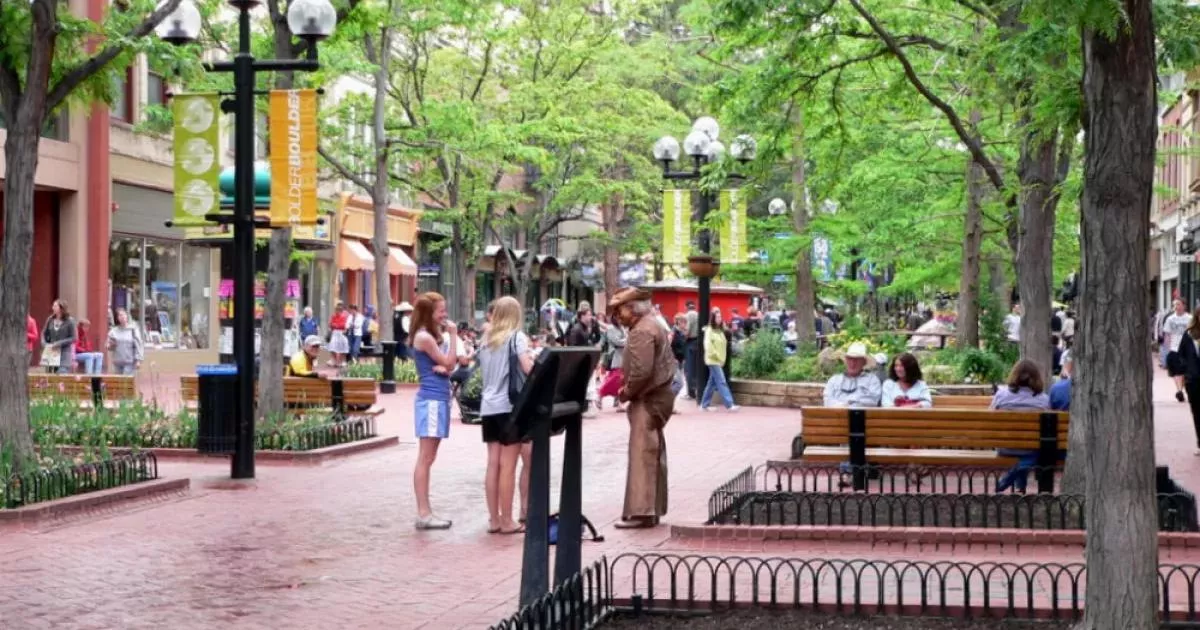Boulder, Colorado is a home rule municipality and the county seat of Boulder County. As of the 2020 census, its population is 108,250, making it the most populous city in the county and the 12th most populous in Colorado. Boulder serves as the principal city of the Boulder metropolitan statistical area, which had 330,758 residents in 2020. The city is also a part of the Front Range Urban Corridor.
1907: Anti-Saloon Ordinance
In 1907, Boulder implemented an ordinance against saloons.
January 17, 1930: Record Low Temperature
The lowest temperature ever recorded in Boulder was -33 °F (-36 °C) on January 17, 1930.
1933: End of Prohibition
Prohibition in Colorado ended in 1933 with the repeal of national prohibition.
1948: Conference on World Affairs Starts
The Conference on World Affairs, a week-long event focused on current issues, started in 1948.
1958: Boulder Philharmonic Orchestra Founded
The Boulder Philharmonic Orchestra was founded in 1958.
1959: "Blue Line" Amendment
In 1959, voters in Boulder passed the "Blue Line" amendment, restricting city water service below 5,750 feet to preserve the mountain backdrop.
1967: Open Space Sales Tax
A dedicated sales tax was approved by Boulder voters in 1967 to purchase open space as a means of curbing urban sprawl.
September 1970: Paladin Press Founded
Paladin Press was founded in September 1970 by Peder Lund and Robert K. Brown.
1970: Comprehensive Plan
Boulder created a "comprehensive plan" in 1970 to guide decisions on future zoning, transportation, and urban planning.
1971: Colorado Daily Severs Ties with CU Boulder
The Colorado Daily, founded in 1892 as a CU Boulder university newspaper, cut ties with the university in 1971 after controversies surrounding its political coverage.
1971: End of Intercity Passenger Rail Service
The last intercity passenger rail services connecting Front Range cities ended with Amtrak's formation in 1971.
1972: Building Height Restriction
In 1972, Boulder put a limit on the height of new buildings to maintain residents' mountain views.
1973: Sleeper filmed in Boulder
Woody Allen's film "Sleeper" was filmed in Boulder in 1973, using locations like houses and the Mesa Laboratory of the National Center for Atmospheric Research.
1974: Historic Preservation Code
A Historic Preservation Code was enacted in Boulder in 1974.
1974: Boulder's First Anti-Discrimination Ordinance
In 1974, Boulder City Council passed Colorado's first ordinance prohibiting discrimination based on sexual orientation, but it was repealed by voters within a year.
1974: Stephen King moves to Boulder
In the autumn of 1974, Stephen King moved to Boulder, Colorado, where he would later write "The Shining".
1974: Lund Buys Out Brown's Share of Paladin Press
Peder Lund bought out Robert K. Brown's share of Paladin Press in 1974.
1975: "Boulder to Birmingham" released
Emmylou Harris released her album "Pieces of the Sky" in 1975, featuring the song "Boulder to Birmingham".
1975: Same-Sex Marriage Licenses in Boulder
In 1975, Boulder County Clerk Clela Rorex became the second person in the U.S. to issue same-sex marriage licenses.
1975: Soldier of Fortune Magazine Founded
Robert K. Brown founded Soldier of Fortune magazine in 1975 after selling his share of Paladin Press.
1976: Danish Plan
Boulder adopted the Danish Plan, a residential growth management ordinance, in 1976.
1976: Residential Growth Control Ordinances in Boulder
Since 1976, Boulder has operated under residential growth control ordinances, causing employment growth to outpace population growth and resulting in significant commuter traffic.
1976: Colorado Music Festival Founded
The Colorado Music Festival, which holds a summer concert series in Chautauqua Auditorium, was established in 1976.
1977: KBCO Founded
Commercial music station KBCO was founded in 1977.
1977: The Shining published
Stephen King's "The Shining" was published in 1977, written during his time living in Boulder.
1978: Boulder Magazine Founded
Boulder Magazine, a lifestyle magazine published three times annually, was established in 1978.
1978: KGNU Founded
Non-commercial community radio station KGNU was founded in 1978.
1978: The Stand published
Stephen King's novel "The Stand" was published in 1978, featuring Boulder as a key setting.
1978: Mork & Mindy premieres
The television sitcom "Mork & Mindy" premiered in 1978, set in Boulder, Colorado.
1979: Bolder Boulder Race Begins
The first Bolder Boulder 10k race took place on Memorial Day in 1979.
1981: Boulder Bach Festival Founded
The Boulder Bach Festival, celebrating the works of J.S. Bach, began in 1981.
1982: Mork & Mindy ends
The television sitcom "Mork & Mindy", set in Boulder, concluded in 1982.
1983: Polar Bear Plunge
The first annual polar bear plunge at the Boulder Reservoir began in 1983, with hundreds of participants jumping into the freezing water on New Year's Day. Rescue teams were present, and hot tubs awaited the brave swimmers after their icy dip.
1987: Dushanbe Tea House gifted
Dushanbe gifted the Dushanbe Tea House to Boulder in 1987.
1988: Colorado MahlerFest Founded
The Colorado MahlerFest, an annual festival honoring Gustav Mahler, was founded in 1988.
February 4, 1989: Coldest High Temperature
Boulder saw its coldest high temperature on February 4, 1989 at -12 °F (-24 °C).
1996: Boulder Planet Competes with Boulder Weekly
The Boulder Planet newspaper emerged as competition for the Boulder Weekly from 1996 to 2000.
1997: Scripps Acquires the Daily Camera
The newspaper conglomerate Scripps acquired Boulder's main daily newspaper, the Daily Camera, in 1997.
July 20, 1998: Warmest Overnight Low
The warmest overnight low was 82 °F (28 °C) on July 20, 1998.
1998: KVCU Begins Broadcasting
KVCU, also known as Radio 1190, a non-commercial radio station operated by university student volunteers, began broadcasting in 1998.
1998: Tea House opens in Boulder
The Dushanbe Tea House opened to the public in Boulder in 1998 after being shipped from Tajikistan.
1998: Naked Pumpkin Run
The Naked Pumpkin Run, where participants run through the city streets wearing only shoes and a pumpkin on their heads, began in 1998. Dozens of people participated in the Halloween tradition.
1999: Forest Ecosystem Management Plan
The city's Open Space and Mountain Parks department began managing roughly 8,000 acres of protected forest based on a 1999 Forest Ecosystem Management Plan designed to improve the health of the forest and reduce the risk of wildfire to both the forest and nearby communities.
2000: End of Boulder Planet
In 2000, The Boulder Planet ceased publication, ending the period in which it competed with the Boulder Weekly as a free publication.
August 2001: Mural dedicated
A mural representing the relationship between Boulder and Mante, Mexico, was dedicated in August 2001 at the Dairy Center for the Performing Arts.
2003: Mosquito Control Plan
Boulder initiated an integrative mosquito control plan in 2003 in response to West Nile virus, including the use of chemical pesticides, with a resident opt-out option.
2004: Lemon Sponge Cake Contemporary Ballet Founded
Robert Sher-Machherndl founded Lemon Sponge Cake Contemporary Ballet in 2004.
2005: Weed Control with Goats
Boulder tested a method of weed control using goats in 2005 to tackle diffuse knapweed and Canada thistle in sensitive areas.
2005: Scripps Acquires the Colorado Daily
Scripps acquired the Colorado Daily in 2005, leaving the Boulder Weekly as the sole locally-owned newspaper.
2006: Catch and Release filmed in Boulder
The movie "Catch and Release" was filmed in Boulder in 2006, showcasing locations such as Celestial Seasonings, the Boulder Farmer's Market, and Pearl Street Mall.
May 17, 2007: Sister City Plaza dedicated
Boulder's Sister City Plaza was dedicated on May 17, 2007, honoring the city's relationships with its sister cities.
2007: First US City to Levy Carbon Tax
In 2007, Boulder made history by becoming the first city in the United States to implement a carbon tax.
2007: Largest Bolder Boulder Race
The 2007 Bolder Boulder race attracted over 54,000 participants, making it the largest timed race in the US and the fifth largest road race globally at the time.
2009: Naked Pumpkin Run Controversy
In 2009, police threatened to charge Naked Pumpkin Run participants with indecent exposure. This resulted in no officially reported naked runners in newscasts, though a few were observed by locals. Subsequent attempts to revive the run led to arrests, and no significant effort to restart it has been successful since.
2009: High Percentage of Bike Commuters
In 2009, the Boulder metropolitan area ranked fourth highest in the U.S. for the percentage of commuters who biked to work (5.4%).
2010: Age Demographics
According to the 2010 census, Boulder had a median age of 28.7, considerably younger than the national average. A significant portion of the population fell within the 18-24 age bracket (29.1%).
2010: Housing Costs Increase
Between 2010 and 2015, the median cost of a home in Boulder increased by a substantial 60%.
2010: Goats at Boulder Reservoir
Goats were employed for weed control at the Boulder Reservoir in 2010.
2010: 420 Gathering at CU Boulder
In 2010, between 8,000 and 15,000 people gathered on the CU Boulder campus on April 20 to celebrate 420 and smoke marijuana. Eleven citations were issued, compared to only two the previous year.
2010: KBCO Relocates Studios
KBCO moved its studios from Boulder to Denver Tech Center in 2010, though retaining its Boulder license and Eldorado Mountain transmitter.
2010: Gross Metropolitan Product
The Boulder MSA had a gross metropolitan product of $18.3 billion in 2010, ranking it as the 110th largest metropolitan economy in the US.
May 2011: B-cycle bike-sharing opens
In May 2011, the B-cycle bike-sharing program launched in Boulder, Colorado, featuring 100 red bikes and 12 stations.
2011: Last Year of Mass 420 Party at CU Boulder
2011 marked the final year of large-scale 420 celebrations at CU Boulder.
2011: Income and Poverty
In 2011, Boulder's estimated median household income was $57,112, while the median family income was $113,681. About 25% of the population and nearly 8% of families were below the poverty line.
June 25, 2012: Record High Temperature
Boulder experienced its hottest day on record on June 25, 2012, with a high of 104 °F (40 °C).
2012: CU Boulder Takes a Stand Against 420
In 2012, CU Boulder took a firm stance against 420 activities, closing the campus to visitors on April 20, using fish fertilizer to deter gatherings, and employing outside law enforcement.
May 30, 2013: Boulder Cruiser Ride Honors "Big Boy"
On May 30, 2013, over 400 cyclists participated in the Boulder Cruiser Ride to honor "Big Boy," an elk killed by a Boulder police officer on New Year's Day.
2013: Best Places for Business and Careers
Boulder was featured on Forbes magazine's list of "Best Places for Business and Careers" in 2013.
2013: 420 Party Ban Continues
CU Boulder continued its 420 party ban in 2013, which fell on a Saturday, and again closed the campus to visitors.
2013: Low Percentage of Car Commuters
In 2013, the Boulder metropolitan area had the fourth lowest percentage of workers commuting by car in the U.S. (71.9%), with 11.1% working from home.
2014: Northwest Rail Line Originally Scheduled to Commence
The Northwest Rail Line (B Line), a proposed 41-mile commuter rail route from Denver to Longmont through Boulder, was initially scheduled to begin service in 2014.
2015: Housing Costs Increase
By 2015, the median cost of a home in Boulder reached $648,200, following a 60% increase since 2010.
2015: 420 Ban Lifted
In 2015, the ban on 420 gatherings at CU Boulder was lifted, and the campus was reopened to visitors on April 20.
2016: Initial Segment of Northwest Rail Line Opens
A 6-mile segment of the Northwest Rail Line opened in 2016, connecting downtown Denver to southern Westminster.
July 2019: Boulder's Political Landscape
As of July 2019, registered voters in Boulder County were 43.4% Democratic, 14.7% Republican, 1.6% other parties, and 40.3% unaffiliated. Boulder is known for its liberal political leanings.
July 2019: Boulder Declares Climate Emergency
Boulder declared a "climate emergency" in July 2019, setting target dates for 100% renewable electricity, reducing greenhouse gas emissions, increasing local renewable energy generation, and community-wide emissions reduction.
2020: Total Area
According to the 2020 United States Census, Boulder had a total area of 17,514 acres, with 664 acres being water.
2020: 2020 Census Data
As per the 2020 census, Boulder was the most populous city in Boulder County, Colorado, and the 12th most populous in the state. The city had a population of 108,250 and was the main city of the Boulder metropolitan statistical area, which had 330,758 residents.
2022: Top Employers Report
Boulder's top employers were listed in the city's 2022 Annual Comprehensive Financial Report.
2023: Front Range Passenger Rail Proposal
As of 2023, the Front Range Passenger Rail proposal aims to connect cities from Pueblo to Fort Collins, and potentially Cheyenne, Wyoming.
2024: Repeal of 1% Growth Cap on Housing Units
In 2024, Boulder's City Council repealed the long standing 1% annual cap on new residential units.
2044: Planned Completion of Northwest Rail Line
The remaining 35 miles of the Northwest Rail Line are projected to be completed by 2044, subject to funding.
Mentioned in this timeline

News encompasses information about current events disseminated through various media...

A car also known as an automobile is a wheeled...

Memorial Day is a U S federal holiday observed on...

Music is a cultural universal involving the arrangement of sound...
Canada is a North American country the second largest in...
Colorado a Mountain and Southwestern U S state is the...
Trending

2 months ago Anthony Davis Trade Rumors: Bulls Interested? AD's Buzzworthy Trade Season Potential.

2 months ago Paul George's Season Debut Possible as Injury Report Upgrades Him to Questionable

9 months ago Sports Updates: Arias benched, Connaughton returns, Green sits, Rollins trending.

3 months ago Jessica Pegula at WTA Finals: Match against Paolini, Sabalenka faces Gauff.

3 months ago Anisimova at WTA Finals: Semifinal showdown against Sabalenka, Rybakina advances to the final.

11 months ago Alex Sarr Shines as Wizards Beat Pistons: Sarr's 19 Points Not Enough
Popular

Thomas Douglas Homan is an American law enforcement officer who...

William Franklin Graham III commonly known as Franklin Graham is...

XXXTentacion born Jahseh Dwayne Ricardo Onfroy was a controversial yet...

Jupiter is the fifth and largest planet from the Sun...

Instagram is a photo and video-sharing social networking service owned...

KFC or Kentucky Fried Chicken is an American fast-food chain...
